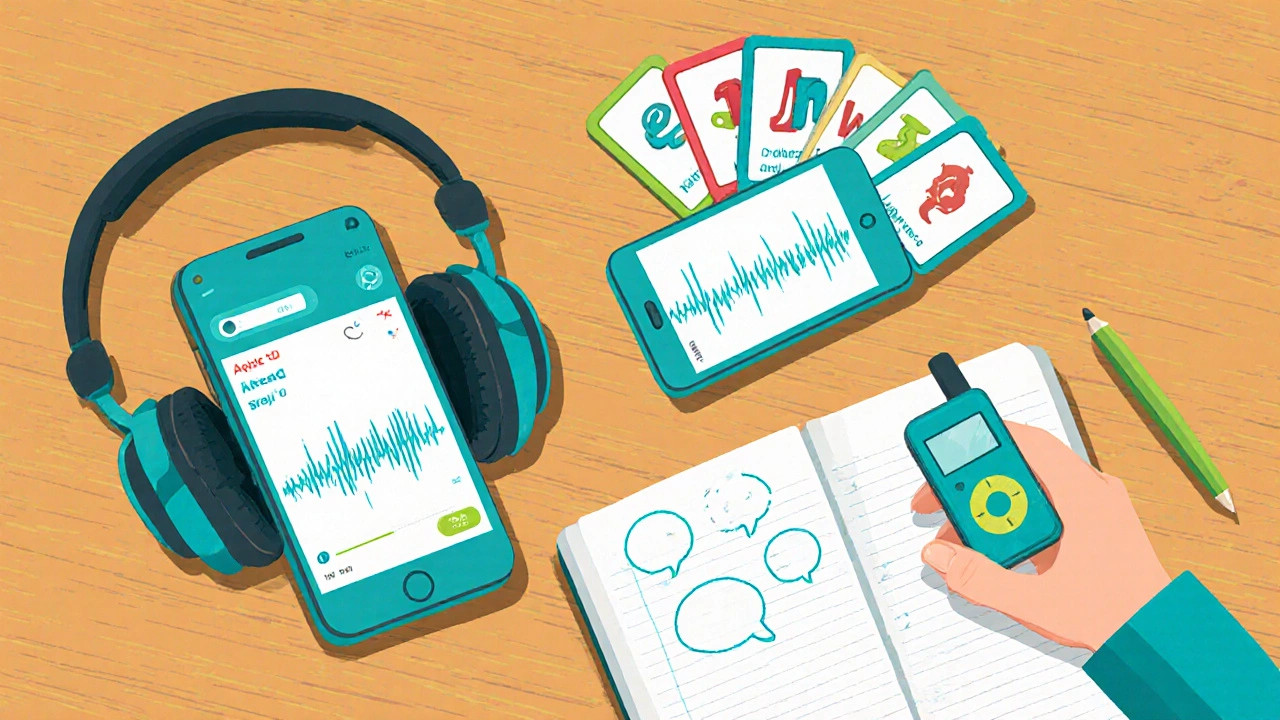Speak English Fluently for Beginners: Simple Steps to Confidence

When you’re just starting out, English speaking is a skill that lets you communicate ideas, share feelings, and connect with people worldwide. It can feel intimidating, but you don’t need a perfect accent to be understood.
Key Takeaways
- Focus on real‑life conversation rather than perfection.
- Spend at least 15 minutes daily on listening, speaking, and vocabulary.
- Use shadowing, language exchange, and short recordings to boost confidence.
- Track progress with a simple journal or an app.
- Stay patient - fluency builds gradually, not overnight.
Understanding Fluency and Confidence
Before you jump into exercises, know what you’re aiming for. Fluency means being able to speak smoothly with minimal pauses is different from grammar perfection. Confidence is the willingness to speak even when you make mistakes often decides whether you’ll keep practicing.
Think of fluency as the vehicle and confidence as the driver. You could have the fastest car (perfect grammar) but if you never start the engine, you won’t go anywhere. Start with small, low‑stakes conversations - ordering coffee, asking for directions - and celebrate each successful interaction.
Build a Strong Vocabulary Foundation
Words are the building blocks of any language. Vocabulary refers to the collection of words you understand and can use doesn’t have to be exhaustive. Pick 5‑7 everyday words each day, learn their pronunciation, and use them in at least three sentences.
Use spaced‑repetition apps (e.g., Anki) to keep words fresh. Group words by topic - food, travel, work - so you can retrieve them naturally when the situation arises.
Master Pronunciation Early
Clear pronunciation helps listeners understand you even if your grammar isn’t perfect. Pronunciation covers individual sounds, stress patterns, and intonation can be improved with three quick habits:
- Listen to native speakers and mimic the rhythm.
- Practice “shadowing”: repeat a sentence right after you hear it.
- Record yourself and compare the waveform to the original.
Don’t obsess over a flawless accent; aim for intelligibility.

Listen to Learn
Listening fuels all other skills. Listening comprehension is the ability to understand spoken language in real time can be trained with podcasts, short videos, or even background TV shows.
Choose material at a slightly higher level than you’re comfortable with - 70‑80% understanding is ideal. While listening, jot down unfamiliar phrases, then look them up and practice using them.
Speak Every Day: Practical Strategies
The only way to get comfortable is to speak daily. Speaking practice includes any activity where you produce spoken English can be as simple as narrating your actions: “I’m boiling water for tea.”
Here are five low‑pressure ways to talk to yourself:
- Describe your surroundings while you walk.
- Summarize a news article aloud.
- Answer a “question of the day” you write yourself.
- Role‑play a phone call with a friend.
- Read a paragraph from a book and then retell it in your own words.
Consistency beats intensity - a 10‑minute daily habit beats a 2‑hour marathon once a month.
Choose the Right Learning Environment
Finding a supportive space speeds up progress. Consider these three options:
- Language exchange: Pair with a native speaker who wants to learn your language. You get real‑time feedback and cultural insights.
- Online speaking courses: Platforms like iTalki or Cambly let you schedule short video sessions with qualified tutors.
- Toastmasters clubs: Public‑speaking groups that meet weekly, encouraging you to give short speeches and receive constructive critiques.
Pick one that matches your comfort level and budget, then stick with it for at least six weeks before switching.
| Method | Time Required (min/day) | Main Benefit |
|---|---|---|
| Shadowing short audio | 10 | Improves pronunciation and rhythm |
| Vocabulary flashcards | 5 | Builds word bank quickly |
| Language‑exchange chat | 15 | Real‑world conversation practice |
| Self‑recorded monologue | 8 | Boosts confidence and self‑correction |
Putting It All Together: A 30‑Day Action Plan
Here’s a simple roadmap you can follow without buying any expensive courses.
- Days 1‑5: Choose 5 new words each day, practice shadowing a 30‑second podcast, and record a 1‑minute self‑introduction.
- Days 6‑10: Add a 15‑minute language‑exchange session; focus on asking open‑ended questions.
- Days 11‑15: Start a daily journal entry spoken aloud, then replay to spot pronunciation gaps.
- Days 16‑20: Join a local Toastmasters meeting (or a virtual one) and give a 5‑minute speech.
- Days 21‑25: Increase listening difficulty - switch to news podcasts with faster speech.
- Days 26‑30: Review all vocabulary, record a 2‑minute summary of a favorite movie, and compare it to your first recording.
Track your feelings after each activity - note moments of ease and moments of struggle. Over a month you’ll see measurable improvement.
Common Mistakes and How to Avoid Them
- Over‑focusing on grammar. Grammar is important, but it shouldn’t block speaking. Allow yourself to speak first, then refine later.
- Being afraid of mistakes. Mistakes are data points that highlight where to improve.
- Skipping listening. Without listening, pronunciation and natural phrasing suffer.
- Inconsistent practice. Even a 5‑minute daily habit beats irregular long sessions.
- Choosing materials that are too easy or too hard. Aim for a “comfortable challenge” - 70‑80% comprehension.
Final Thought
Fluently speaking English as a beginner isn’t about mastering every rule; it’s about building a habit of communication. By mixing vocabulary, listening, pronunciation, and real‑world practice, you’ll notice steady gains. English speaking will become a natural part of your day, not a stressful chore.
How much time should a beginner spend on speaking practice each day?
Even 10‑15 minutes daily is enough to build momentum. Consistency beats occasional marathon sessions.
Do I need an accent‑reduction course to sound fluent?
No. Clear pronunciation and intelligibility matter more than sounding native. Focus on stress and intonation first.
What’s the best way to expand my vocabulary quickly?
Learn words in context - pick a topic, collect 5‑7 related words, and use each in three sentences the same day.
Can I become fluent without ever visiting an English‑speaking country?
Yes. Online language exchanges, podcasts, and virtual clubs provide abundant authentic input and speaking opportunities.
How do I stay motivated when progress feels slow?
Set tiny, measurable goals (e.g., “introduce myself in 30 seconds”). Celebrate each win and keep a voice‑recording log to hear your own improvement over time.

